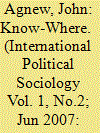|
|
|
Sort Order |
|
|
|
Items / Page
|
|
|
|
|
|
|
| Srl | Item |
| 1 |
ID:
077547


|
|
|
|
|
| Publication |
2007.
|
| Summary/Abstract |
This article argues that while globalization theory is far from being past its most productive phase, as some of its critics claim, it does exhibit a number of shortcomings, particularly when it comes to identifying a clear point of reference for what is taken to be globalized and applying theoretical concepts developed in the analysis of national societies to a global level. This article argues that globalization theory stands on solid ground in that globalization theory has developed four strands of research, which are fairly well developed and which distinguish it as a separate field of inquiry, these four strands being the understanding of globalization as inherently varied globalization, global governance research, global history, and global/world society research. It argues that in order to redress some of the problems of globalization theory, it is necessary to build on these four strands and merge them with the traditional sociological concepts of functional differentiation and rationalization as well as with insights from complexity theories.
|
|
|
|
|
|
|
|
|
|
|
|
|
|
|
|
| 2 |
ID:
077546


|
|
|
|
|
| Publication |
2007.
|
| Summary/Abstract |
This article examines the forms of power brought into play by the deployment of biometrics under the lenses of Foucault's notions of discipline and biopower. These developments are then analyzed from the perspective of governmentality, highlighting how the broader spread of biometrics throughout the social fabric owes not merely to the convergence of public and private surveillance, but rather to a deeper logic of power under the governmental state, orchestrated by the security function, which ultimately strengthens the state. It is associated with the rise of a new governmentality discourse, which operates on a binary logic of productive/destructive, and where, in fact, the very distinctions between private and public, guilty, and innocent-classic categories of sovereignty-find decreasing currency. However, biometric borders reveal a complicated game of renegotiations between sovereignty and governmentality, whereby sovereignty is colonized by governmentality on the one hand, but still functions as a counterweight to it on the other. Furthermore, they bring out a particular function of the "destructive body" for the governmental state: it is both the key figure ruling the whole design of security management, and the blind spot, the inconceivable, for a form of power geared toward producing productive bodies.
|
|
|
|
|
|
|
|
|
|
|
|
|
|
|
|
| 3 |
ID:
077545


|
|
|
|
|
| Publication |
2007.
|
| Summary/Abstract |
The problem of "foundations" is a crucial one for any field, particularly perhaps one with as varied a possible repertoire of elementary sources as the study of world politics. In this paper, I draw attention to how some different ways of thinking about where knowledge is produced and how it circulates can be used to inform understanding about geographies of knowledge of world politics. Such geographies, however, are not ends in themselves. The point is to understand the ontological bases of knowing from perspectives that do not privilege a singular history of knowledge associated with a specific world region or of conceptions of knowledge that implicitly or explicitly presume their self-evident universality. In other words, we need to move beyond the all-too-conventional repertoires of relativism and positivism in understanding the bases to knowing about world politics/international relations. The paper suggests some ways forward, which should now be the subject of vigorous debate
|
|
|
|
|
|
|
|
|
|
|
|
|
|
|
|
| 4 |
ID:
077544


|
|
|
|
|
| Publication |
2007.
|
| Summary/Abstract |
Civilian border patrol groups, like the much publicized Minutemen, who engage in the unofficial and unauthorized patrolling of U.S. borders, have proliferated in recent years. They have received an overwhelming amount of press, both national and international, but have garnered very little scholarly attention. In this article, I explore this phenomenon with an eye toward addressing conceptual and theoretical issues raised by the existence and practices of these groups. Specifically, how do we conceptualize civilian border patrol groups in terms of their relationship to statecraft, identity, and security? Do they have implications for the ways in which sovereignty and the political can be understood? I argue that while Carl Schmitt's theory of the political and the Copenhagen School's securitization theory are useful in attempting to understand and theorize the practices of these groups, the case ultimately points to the need for a reexamination of some of Schmitt's concepts including sovereignty and the political. Evidence from this case suggests that we should not limit our understanding of decisions that result in contemporary manifestations of exceptionalism to those controlled by the state or elites. Rather, decisions can arise in numerous locales and can be made by seemingly insignificant agents. This has implications for how we understand the practices that can lead to exceptionalism as well as how we understand sovereignty and the political
|
|
|
|
|
|
|
|
|
|
|
|
|
|
|
|
|
|
|
|
|